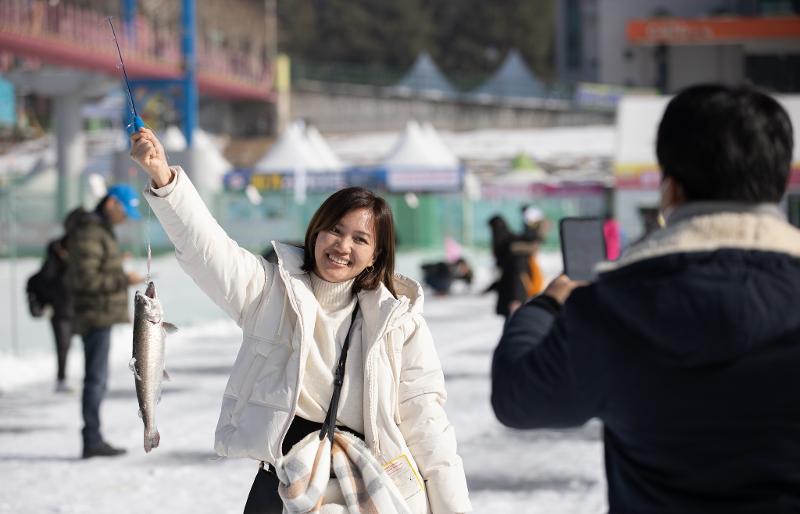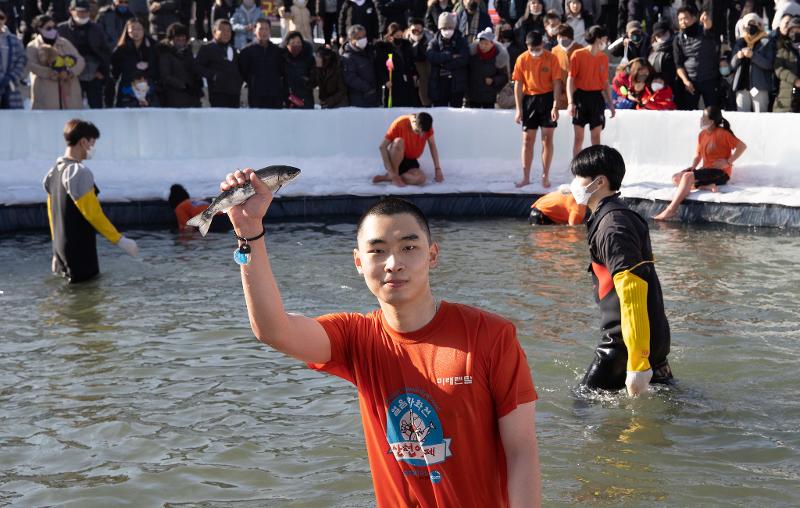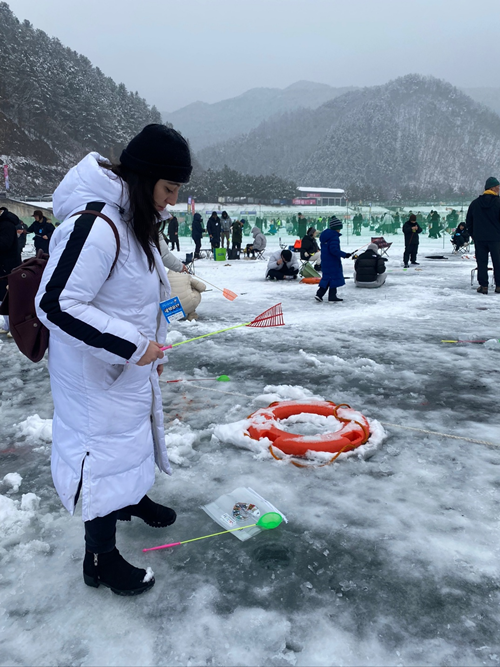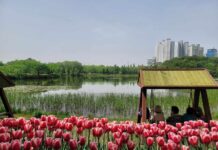By Hong Angie and Aisylu Akhmetzianova
Video = Lee Jun Young
A burs ride lasting 2 1/2 hours departed from the Myeong-dong neighborhood of Seoul and arrived at a “winter empire” around Hwacheoncheon Stream in the town of Hwacheon-eup in Hwacheon-gun County, Gangwon-do Province. With a clear sky and high mountains in the background, the large fishing area presented a scene right out of a postcard.
Korea.net staff writers on Jan. 9 visited this year’s Hwacheon Sancheoneo Ice Festival held in and around the stream. This event is held in January when Hwacheoncheon, famous for its clean water, is frozen solid. Due to COVID-19, the event this year is being held for the first time in three years.
The highlight of the festival is to catch sancheoneo (mountain trout) underneath ice through holes cut in the surface of the frozen stream. Dubbed the “stream queen,” the species lives only in places with the freshest water.
In 2011, CNN featured the festival one of the “seven wonders of winter.” Prior to the pandemic, the event annually attracted more than a million people.
The site was full of tourists enjoying the festival even on a weekday morning. The plethora of ice-related activities included lure and ice fishing, snow sledding, bobsledding, ice soccer and ice skating. A separate fishing area is reserved for foreign visitors, where people try to catch mountain trout and volunteer workers are on hand to offer help.
Shin Dong-hyeok, a county official for global marketing, said, “We have a separate ice fishing site for foreign visitors for their convenience because most of them are trying ice fishing for the first time.”
Ice fishing was not as easy as it looked. The staff writers waited about five minutes holding their fishing rods with no bites. They spotted a volunteer worker and asked for help, and he said to constantly move the fishing road.
Because ice fishing uses no bait, a fishing hook that shines under water is supposed to draw the fish’s attention. Fifteen minutes after getting this instruction, the writers caught three mountain trout. The estimated 20 cm-long fish were heavier than expected, and two went missing while pulling out fishing rods.

A foreign tourist at this year’s Hwacheon Sancheoneo Ice Festival on the morning of Jan. 9 celebrates catching a sancheoneo (mountain trout) at Hwacheoncheon Stream in the town of Hwacheon-eup in Hwacheon-gun County, Gangwon-do Province. (Kim Sunjoo)
Mariel Mae Payongayong from the Philippines, who visited with three friends, said she enjoys this festival a lot because of the difficulty of seeing snow in her country. “Ice fishing is the most interesting,” she said.
Thomas Porhel, a French national working in Seoul, said, “I got to know this festival through social media,” adding, “It is fun to have ice here and there.”
At the bare-handed fishing area, domestic and foreign visitors wearing shorts and short sleeves jumped into the water despite the freezing cold to go after mountain trout.

A visitor to the festival on the afternoon of Jan. 9 poses with a sancheoneo (mountain trout) after catching it with his bare hands at Hwacheoncheon Stream in the town of Hwacheon-eup in Hwacheon-gun County, Gangwon-do Province. (Kim Sunjoo)
Yeom Won-seok, a bare-handed fishing participant, said the weather was freezing and downplayed his chances of catching fish, adding “Fish are so slippery but I still caught two.”
The Hwacheon-gun office operates group programs for foreign tourists, who are also eligible for a KRW 10,000 gift certificates for use at businesses in the region. The services available to them include a separate fishing area, fishing equipment rentals, prayer room for Muslims and professional interpreters in English and Chinese. Registration is available on the festival’s official website (http://www.narafestival.com).
As the festival’s host, the county has put top priority on safety. Every morning, it measures the thickness of the ice, which measured 36 cm on Jan. 9. The maximum number of visitors to the site each day is decided after determining if the ice is thick enough and whether any cracks are found. Police officers and firefighters are on patrol around the site over the event period.
The county said the cumulative number of visitors to the festival from Jan. 7-17 was 729,000. The event will run through Jan. 29 near Hwacheoncheon Stream.

Rebeca Arcega Hernando, a Korea.net Honorary Reporter from Spain, on Jan. 7 tries ice fishing at the festival around Hwacheoncheon Stream in the town of Hwacheon-eup in Hwacheon-gun County, Gangwon-do Province. (Rebeca Arcega Hernando)
shong9412@korea.kr























